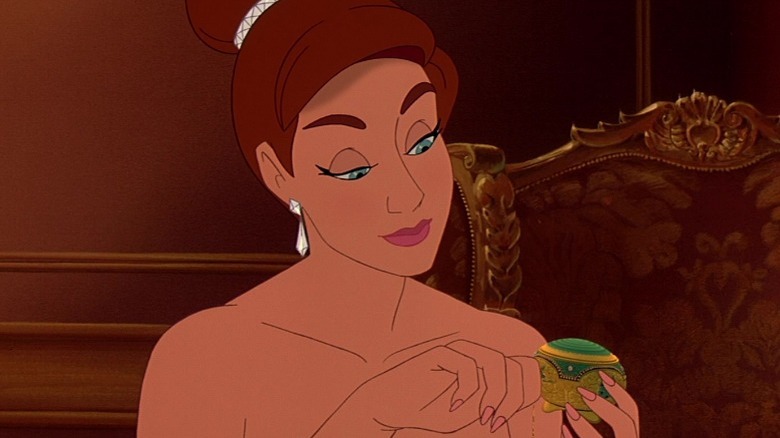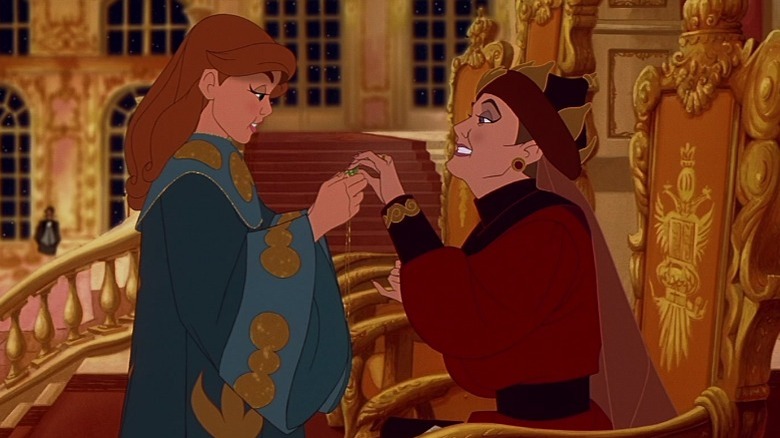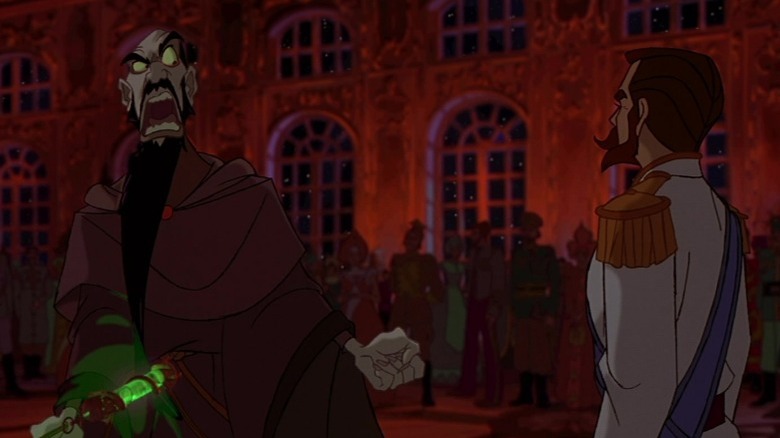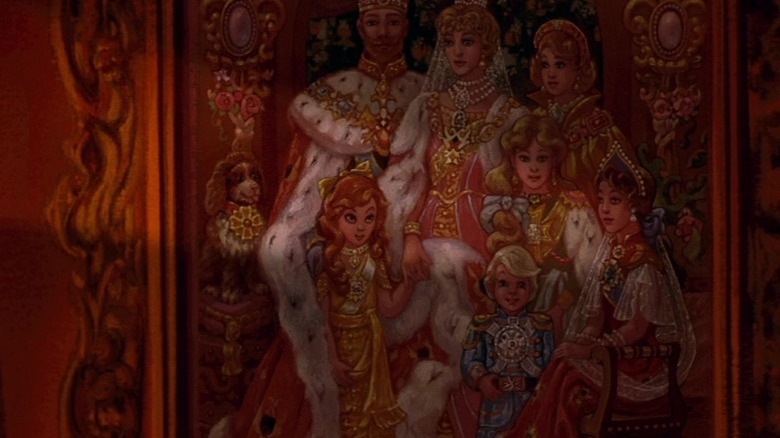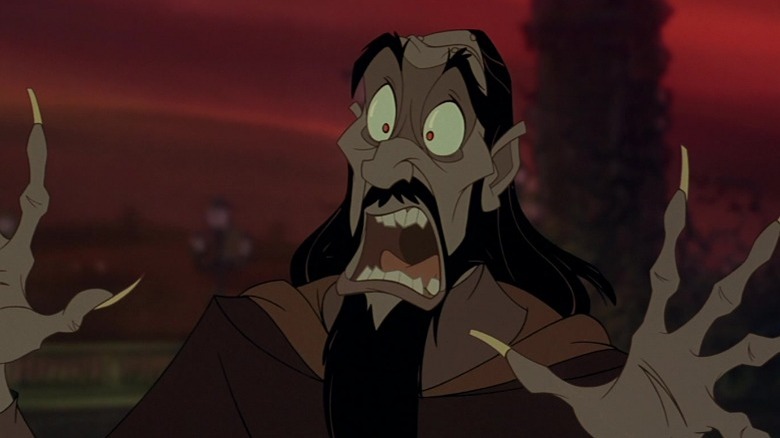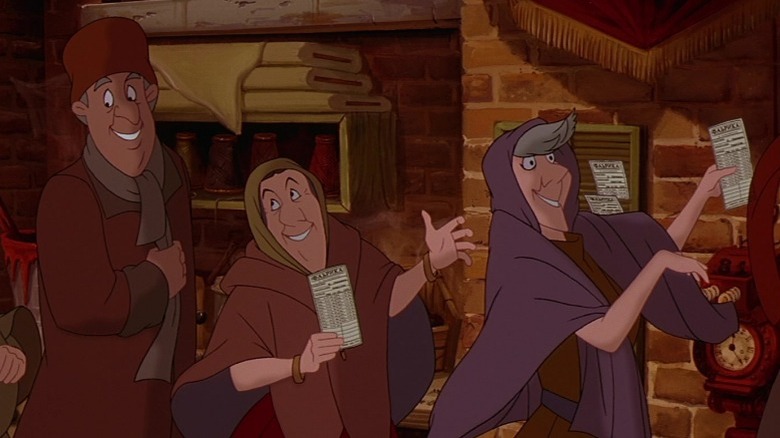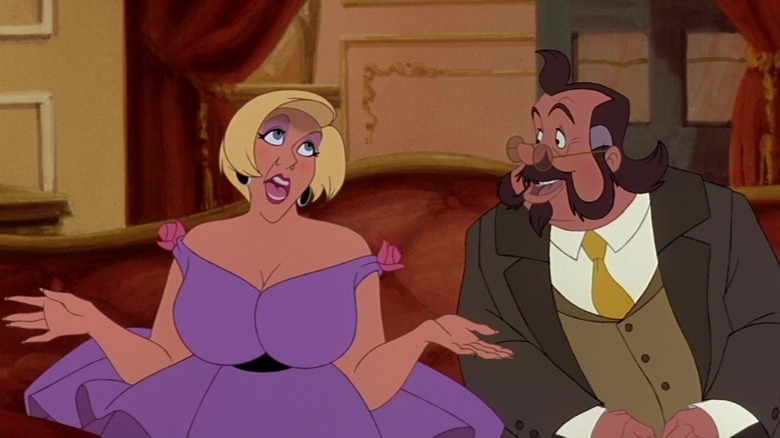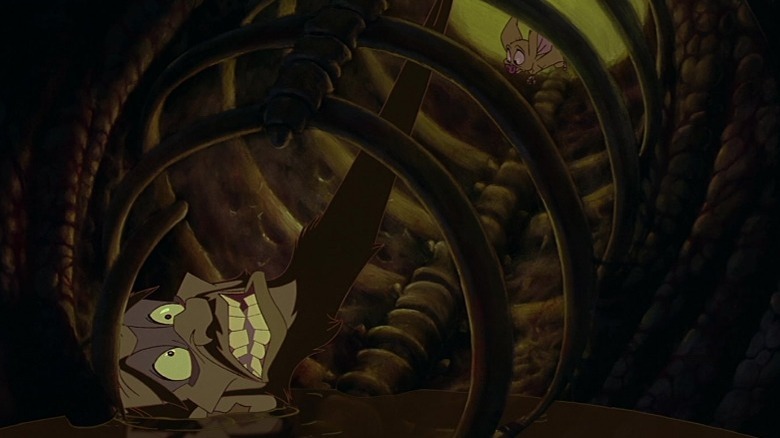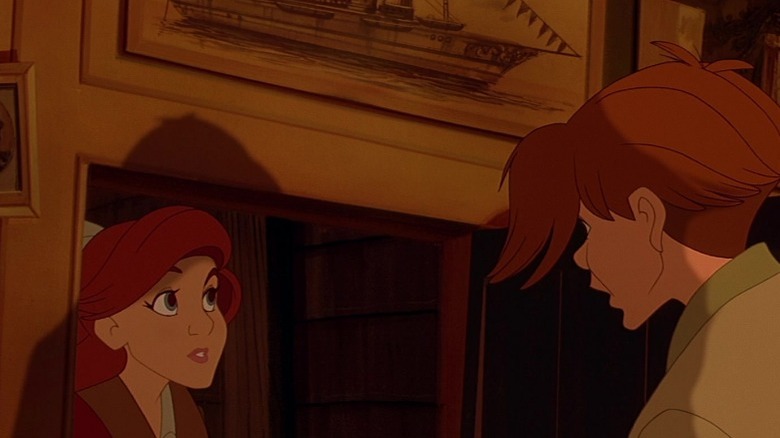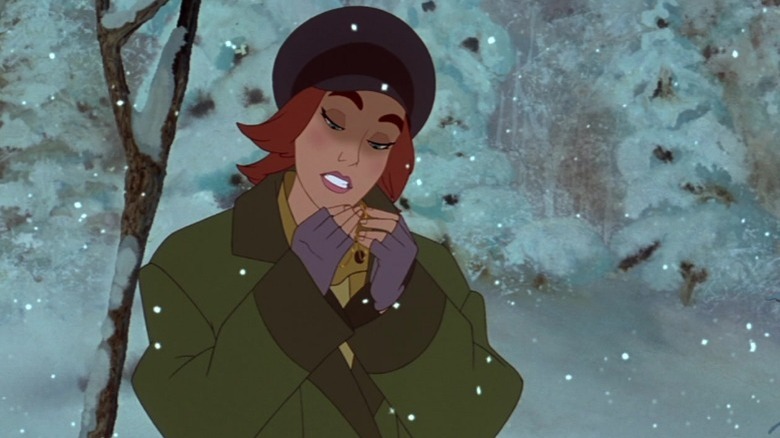Everything Anastasia Doesn't Tell You About The True Story
It's a teensy bit perplexing why 20th Century Fox decided to turn the story of Anastasia Romanov into an animated family musical. In real life, Anastasia's father was a misguided monarch who sent millions to war. Her mother was an equally misguided monarch who called her subjects "pretty dishrags," according to The Chicago Tribune. Her brother almost bled to death from a sledding injury (per TrendChaser), and the real Rasputin was a notorious womanizer. Not to mention Anastasia and her entire family were executed by firing squad. We can't help but wonder who looked at these historical events and decided, "That would make a perfect kid's movie!"
But considering its dark historical context, "Anastasia" is actually a satisfying movie — if you can divorce it from actual history and just appreciate it in its own right. The movie shouldn't work, but it does. Thanks to its memorable music and its charming characters, "Anastasia" is one of the best animated movies from the '90s that didn't come from Disney. Still, it's worth noting that the movie's plot is built on a shaky foundation of historical inaccuracies. Below, we've compiled all the creative liberties the filmmakers have taken with the true story of Anastasia.
Anastasia wasn't a princess
Not only is Anastasia (Meg Ryan) not a Disney Princess (via Polygon), she's not even a princess at all. Although the film often refers to her as the lost princess, she was technically a Grand Duchess. While there were dozens of princesses in Russia, the title of grand duke or duchess was reserved for the children of the monarch, although crucially, Anastasia wasn't heir to the crown. According to The Russian Legitimist, daughters could only inherit the Russian throne if there were no male relatives to claim it. For this reason, says Alexander Palace, Anastasia's parents desperately wanted a son; they got their wish when Anastasia's brother Alexei was born.
Thus, Alexei would have been next in line, says Bustle. Of course, since Alexei had hemophilia, a potentially deadly genetic disease, his father Tsar Nicholas II (voiced by Rick Jones in the movie) needed to consider who might succeed the throne if Alexei died. In that scenario, the crown would've gone to Alexei's uncle, Grand Duke Michael Alexandrovich.
However, it wasn't meant to be. Alexandrovich was murdered in June 1918, followed shortly by Alexei, Anastasia, and their parents just a month later. But even if Anastasia had miraculously survived, she would have needed to get in line behind some distant male relatives who had survived, since they would have succeeded the throne before her.
The timeline is all messed up
To keep the movie simple, the minds behind "Anastasia" fudged some of the dates and tweaked the order of certain historical events.
The inaccuracies begin right from the opening scene. When the voiceover from Dowager Empress Marie (Angela Lansbury) announces that the story begins in winter 1916, the 300th anniversary of the Romanov dynasty, that's a fib. The year 1916 would have marked the 303rd year of the Romanov reign, according to Bustle. Meanwhile, the angry mobs seen at the beginning of the movie are likely meant to be the crowds of protesters that took to the streets of St. Petersburg in March 1917 — by which point, Grigori Rasputin (Christopher Lloyd) had already been dead for three months. The Odyssey Online speculated that the filmmakers changed the timeline to consolidate the story, combining Rasputin's death and the 1917 Revolution into a single chain of events.
In the movie, Rasputin casts a curse on the Romanovs, insisting they will die within a fortnight. Actually, the Romanovs wouldn't die until 1918, but the real-life Rasputin reportedly foretold the year of their downfall, says Russiapedia. While he was at it, Rasputin predicted (correctly) in December 1916 that he would be dead in two weeks. Of course, his predictions could possibly be a hoax – Explore the Archive points out that the original letter with Rasputin's predictions was never recovered.
Rasputin was actually a family friend of the Romanovs
In the movie, Dowager Empress Marie says, "We thought [Rasputin] was a holy man, but he was a fraud." This much is true, but the royal family would have never known Rasputin was a phony. Sure, many people from the Russian working class and the nobility alike despised him, explains History.com, because he had the ear of Empress Alexandra and thus a phenomenal amount of power. However, in the eyes of the Tsar and Tsarina, Rasputin could do no wrong. The family, especially Alexandra, felt indebted to this healer after he reportedly saved Alexei's life. When it looked like Alexei would bleed to death from his hemophilia, Rasputin's soothing words and prayers seemed to bring the boy back from the brink (via Russiapedia).
Most historians agree that Rasputin was indeed taking advantage of Tsarina's favor. Alexandra let him appoint whomever he wanted as ministers while her husband was away during wartime, says Explore the Archive. Soon Rasputin earned the reputation of a ladies' man and a decadent partygoer — but only while the Empress wasn't looking. As far as Alexandra was concerned, he was practically a member of the family. The Romanovs believed in Rasputin right up until his death — and even after. According to Explore the Archive, Anastasia and her sisters had worn pendants that contained photos of Rasputin, and were in fact wearing them on the day of their execution.
Anastasia's family was violently executed
The animated film glosses over the deaths of Anastasia's family. In fact, it never explicitly says they are dead, instead just giving viewers an ominous glimpse of the burning palace. The truth is a lot uglier.
The Romanov family wasn't killed by an angry mob in a fit of passion. Instead, it was a premeditated execution. History.com explains that while the Romanovs were under house arrest, a Bolshevik named Yakov Yurovsky had been busy planning their assassination, even collecting sulfuric acid to render the bodies unrecognizable before their killers disposed of them. On the night of their execution, Anastasia and her family were confined in a mansion in Yekaterinburg dubbed the "House of Special Purpose" (per Town and Country Magazine). On July 17, 1918, soldiers ushered the Romanovs down to the basement in the middle of the night, claiming it was for their own protection. In actuality, says the Constitutional Rights Foundation, the Bolsheviks were worried that the approaching White Army would rescue the Tsar, so they decided to eliminate him. Once the Romanovs were rounded up in the basement, the family barely had a moment to react before the firing squad began shooting.
The victims of this tragedy weren't just the family and a few of their servants. According to TrendChaser, the soldiers killed the family's two little dogs, too, in a move that would make even the Wicked Witch of the West queasy.
Rasputin didn't cause the Russian Revolution
"Anastasia" makes it seem like Rasputin single-handedly brought down the Romanov dynasty. Certainly, he was a big help — his womanizing and reckless decisions would only fan the flames of anger toward the royal court — but we think it's safe to say that the film gives him too much credit. The fall of the Romanovs was actually a team effort.
For one, you can thank Tsar Nicholas II for dragging his country into WWI. According to History.com, Russia sustained more casualties than any other country in WWI; the country suffered food shortages as a result, which made the Romanovs mighty unpopular. As well, it didn't help that the Tsarina looked down upon her subjects. When female workers took to the streets in March 1917 to protest the food shortages and low wages, the Empress wrote (via Smithsonian), "It's a hooligan movement, young boys and girls running about and screaming that they have no bread, only [for attention]." Combine that with the Provisional Government neglecting to pull Russia out of the much-despised war after the Tsar stepped down (per Ohio State University), as well as the Bolsheviks seizing control during the chaos, and you end up with a disaster waiting to happen.
Needless to say, whenever the riots broke out, there was no demonic intervention. In fact, Rasputin played no part in it. He was dead three months before the revolution began.
The Rumor in St. Petersburg song is painfully inaccurate
Although "Anastasia" has certainly earned cult classic status, there are a few moments in this '90s cartoon that haven't aged well. For instance, the opening verse of the song "Rumor in St. Petersburg" treats serious historical events with a cringe-worthy levity. "Since the revolution, our lives have been so gray," sings one Russian sweatshop worker, referring to the 1917 Revolution in Russia. But the only hardship actually shown is the laughable scenario of a worker with icicles on his clothes.
Not only are the lyrics in poor taste, but they're also historically inaccurate. At the time, the city wasn't even called St. Petersburg, points out Bustle. Instead, it had been dubbed Leningrad. (Though we suppose "Rumor in Leningrad" isn't nearly as catchy.) What's more, says The Odyssey Online, one of the police officers in the song is wearing a Soviet uniform that's not accurate for the time period — as in, more 1980s than 1920s.
The song makes it seem as though the myth of Anastasia was a beacon of hope that made everybody's miserable lives bearable. The reality is a lot more complicated. Certainly, the announcement of the execution of the Romanovs swayed public opinion. History.com observes that the news made the public distrustful of the Bolsheviks and nostalgic for the days of royal rule. But we doubt that these workers would've gotten so worked up about the lost duchess. More likely, they would've had bigger concerns, like civil war and the secret police (via The History Guide).
Alexei's hemophilia is conveniently omitted
Alexei Romanov, the heir to the throne who was pampered by his entire family, once told his mother, "Why can other boys have everything and I nothing?" (via Alexander Palace). At a glance, that sounds like the complaint of a spoiled prince, but there's a grain of truth to his words. Anastasia's brother was actually forbidden from doing activities that most boys his age could enjoy. Alexander Palace explains that Alexei's mother wouldn't let him ride a bike or play tennis, due to his hemophilia (a disease that makes it difficult for your blood to clot, according to Mayo Clinic). Anna Vyrubova, a family friend of the Romanovs, once wrote (via Alexander Palace) "If [Alexei] bumped his head or struck a hand or foot against a chair or table, the usual result was a hideous blue swelling indicating a [painful hemorrhage beneath his skin that would last] for days or even weeks." It's no wonder, then, that Alexandra wouldn't let Alexei anywhere near a bike.
Alexei doesn't appear at all in "Anastasia," except in a dream sequence, but his brief cameo doesn't seem true to history. In Anastasia's dream, she and Alexei leap off a high ledge into a lake, while their parents beckon them to jump from below. Knowing how protective the family felt toward Alexei, and how easily Alexei could get seriously injured, this scenario seems rather unlikely. But then, the filmmakers have plausible deniability here, since the whole sequence is just an illusion conjured up by Rasputin.
The real Sophie wasn't as gullible
The character Sophie (Bernadette Peters) is loosely based on a real-life person: Baroness Sophie Buxhoeveden, a former lady-in-waiting to Anastasia's mother. However, aside from her name and her basic role in the story, 20th Century Fox preserved almost nothing about the real Sophie.
Unlike in the movie, Baroness Sophie wasn't the cousin of the Dowager Empress, says Bustle. More importantly, she wasn't the sole "gatekeeper" that Anastasia wannabes needed to convince in order to get an audience with Marie. According to Refinery29, Buxhoeveden was one of many people who cross-examined the most famous Anastasia impostor, Anna Anderson (who was actually a Polish factory worker named Franziska Schanzkowska). Schanzkowska was interviewed by plenty of other folks who had known the Romanovs, including Princess Irene of Prussia and Captain Nicholas von Schwabe. So in theory, if Dmitri (John Cusack) and Vladimir (Kelsey Grammer) couldn't persuade Sophie that Anastasia was the real deal, they could have gone to either of those people instead.
Also, the real Sophie was a bit less naive than her animated counterpart. When she visited Anna Anderson in a Berlin mental asylum to see if she was a real Romanov, says Refinery29, the Baroness quickly called her bluff.
The movie omits the creepiest details of Rasputin's death
While it may be disturbing to watch Rasputin's death at the end of the movie, the real Rasputin's death was even more gruesome. The "Mad Monk" didn't sell his soul and become a shambling zombie, but by some accounts, he was almost unkillable.
Rasputin's immense influence made many Russian noblemen jealous, including Anastasia's cousin Felix Yussupov, says Smithsonian Magazine. So Yussupov lured Rasputin to his home and served him pastries laced with cyanide. However, the poison seemed to have no effect on Rasputin, says Russiapedia. By this point, Yussupov was seriously spooked; he drew his gun and shot Rasputin. Apparently, the bullet still wasn't enough. According to Yussupov's account, Rasputin managed to stagger out the door, only succumbing after his assailants shot him a second time. Not wanting to take any chances, Yussupov dumped Rasputin's body in an icy river. (That's one thing the movie got right; Rasputin was indeed sent to a watery grave.) When Rasputin's body washed up three days later, the police couldn't find even a hint of poison in the body (per Explore the Archives). And some versions of the story claim that it was only the water, not the bullet, that killed him (per Smithsonian).
It's worth noting that Yussupov was probably exaggerating the incident to paint himself as a hero, says Smithsonian, and the autopsy of Rasputin seemed to indicate he was already dead before he hit the water. Still, who knows? Maybe zombie-Rasputin wasn't too far off the mark ...
If Anastasia had escaped, it would've been very different from the movie
There is no way Anastasia could have escaped the palace via a secret passageway, as the movie depicts. Anastasia had been with her family the entire time, from the 1917 Revolution to their execution in 1918. If she did escape somehow, it could've only been after she and her family stood before the firing squad.
According to Town and Country, Anastasia did outlive her parents (if only for a few minutes). She and her sisters had sewn jewels into their clothing to hide them from the soldiers, so they functioned almost like a bulletproof vest. Miraculously, after the executioners lowered their guns, Anastasia and her siblings were shaken but still seemingly unharmed. Unfortunately, that didn't make any difference, because the soldiers went in with their bayonets to finish the job.
Although scientists have conclusively proven that Anastasia didn't survive (per The Los Angeles Times), it's certainly plausible that, in a slightly different version of history, one of the soldiers might have quietly spared her life. After all, says Town and Country, records indicate that most of the soldiers aimed at the Romanov parents during the first round of shooting, each secretly wanting to avoid being the one who pulled the trigger on the kids. In fact, The Siberian Times points out that even though the Bolsheviks killed most of the family's dogs, one soldier decided to spare Alexei's dog and take care of it. In a different world, perhaps someone would have taken pity on Anastasia, too.
DNA tests have confirmed that Anastasia didn't survive
There's one inaccuracy in "Anastasia" that looms bigger than the rest. So big, in fact, that the entire movie is built on this premise. We hate to break it to you, but the truth is that Anastasia was indeed murdered alongside the rest of her family. For almost a century, there was at least a feeble chance that Anastasia had survived. Then, five skeletons unearthed in 1991 were confirmed to be Nicholas, Alexandra, and three of their five children (per Refinery29). This discovery allowed scientists to prove that Anastasia imposter Anna Anderson was not the real deal, says the Constitutional Rights Foundation.
However, there was still a crucial loose end. According to Refinery29, Alexei's body was missing from the grave, as well as one of his sisters, which gave new weight to the hope that Anastasia had survived. Yet in July 2007, the two missing skeletons were found buried in a separate location. The Los Angeles Times reported that the DNA extracted from the two skeletons matched up with the DNA of the Romanov family, putting the theory to rest once and for all.
To be fair, the fateful DNA test was taken more than 10 years after the 1997 animated movie came out. And even now, after we know for certain that Anastasia didn't make it, we can still enjoy this film as an alternate history.

